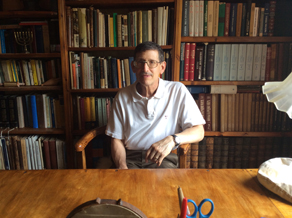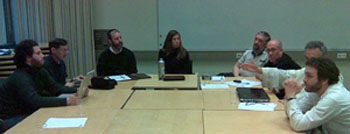RELATED WEBSITES
Messianic Jewish Theological Institute
Father David Neuhaus, Latin Patriarchal Vicar, responsible for the Saint James Vicariate for Hebrew Speaking Catholics in Israel, has published a pastoral letter on the occasion of the 60th anniversary since the founding of the Work of Saint James. The letter was published on the Feast of Edith Stein, August 9, 2015.
Read here
 by Rabbi Dr. Mark Kinzer
by Rabbi Dr. Mark KinzerRead an excerpt: "On April 27, 2014 the Catholic Church officially recognized Pope John XXIII and Pope John Paul II as saints. Media reports focused on the appeal these two figures held for rival segments of the Church; John XXIII inspired progressives, while John Paul II earned the devotion of traditionalists. Little attention was given to the revolution in Catholic teaching and sensibility that these two Popes jointly accomplished;John XXIII as initiator, John Paul II as interpreter, emblematic personality, and implementer." Read more (entire first chapter)
This book is available at Wipf and Stock, Amazon (also Kindle edition)
The Jewish People and the Identity of the Church
Rabbi Mark Kinzer, Messianic leader of the Zera Avraham Congregation in Ann Arbor, Michigan (b. 1952), has recently published a book on Nostra Aetate and its significance for Jews and Christians, Searching Her Own Mystery: Nostra Aetate, the Jewish People and the Identity of the Church (Eugene, Cascade Books, 2015). The book is an important contribution to the interpretation of Nostra Aetate and to the ongoing dialogue between Jews and Catholics, particularly those Jews who do believe that Jesus is the Messiah.
This year is the fiftieth anniversary of Nostra Aetate, the document that redefines the Catholic Church’s teaching on the relationship with members of other religions. The document was formulated during the Second Vatican Council, a council that brought together the leaders of the Catholic Church from all over the world. They deliberated for three years, from 1962 until 1965, redefining the Church’s relationship with the modern world and formulating the Church teaching within the context of the twentieth century. Nostra Aetate, translated “in our times”, redefined the attitude of the Catholic Church towards non-Christian religions. Discussions on the formulation of the document that became Nostra Aetate began with discussions on the attitude of the Catholic Church towards Jews and Judaism and this subject, the content of paragraph 4, is the longest part of the text.
Rabbi Kinzer defines four major changes evoked by Nostra Aetate in its long paragraph on the Jews and Judaism:
 - The rejection of the claim that the Jews killed Christ. This tragically wrong interpretation of the Gospel has had devastating consequences for the Jews throughout the past two thousand years of history. The Council denounced anti-Semitism and all forms of racism!
- The rejection of the claim that the Jews killed Christ. This tragically wrong interpretation of the Gospel has had devastating consequences for the Jews throughout the past two thousand years of history. The Council denounced anti-Semitism and all forms of racism!
- The reminder that Jews and Christians have a shared heritage not only focused on the Old Testament as a common patrimony but also emphasized that Yeshua, his Blessed Mother, the apostles and the early Church are Jewish.
- The insistence that the Jews are a chosen people and have an irrevocable vocation. They are not rejected by God because God is always faithful despite our faithlessness. In a particularly revolutionary formulation, the document, basing itself on Romans 11:29, a text never cited before in the Magisterium of the Church, said: “God holds the Jews most dear for the sake of their Fathers; He does not repent of the gifts He makes or of the calls He issues.”
- Finally, Kinzer claims that the document drives home the realization that the Church and the Jews are inextricably linked in the sight of God. It is from here that he derives the title of his book, quoting the beginning of paragraph 4: “As the sacred synod searches into the mystery of the Church, it remembers the bond that spiritually ties the people of the New Covenant to Abraham's stock”.
The renewal and purification of memory led to a change in thought and language that transformed a “teaching of contempt”, a phrase formulated by the Jewish French historian Jules Isaac, who encountered Pope John XXIII in 1960, into a “teaching of respect”.
Kinzer’s book goes on to deepen an understanding of the theological challenges that result from Nostra Aetate, examining ecclesiology, the sacraments of priesthood, baptism and Eucharist and challenging the Church and the Jewish people to pursue an understanding of sacramental presence that brings them ever closer together. The book includes fascinating sections on Kinzer’s own spiritual journey and the ongoing dialogue between Messianic Jews and Catholics.
In this section you can read the papers and the final statements of all the previous -as well as this year's- consultations.

READ the Resolution and Press Release here
READ the Press Release here
Go to the presentations here
Go to page here
READ the Press Release here
GO to the presentations here